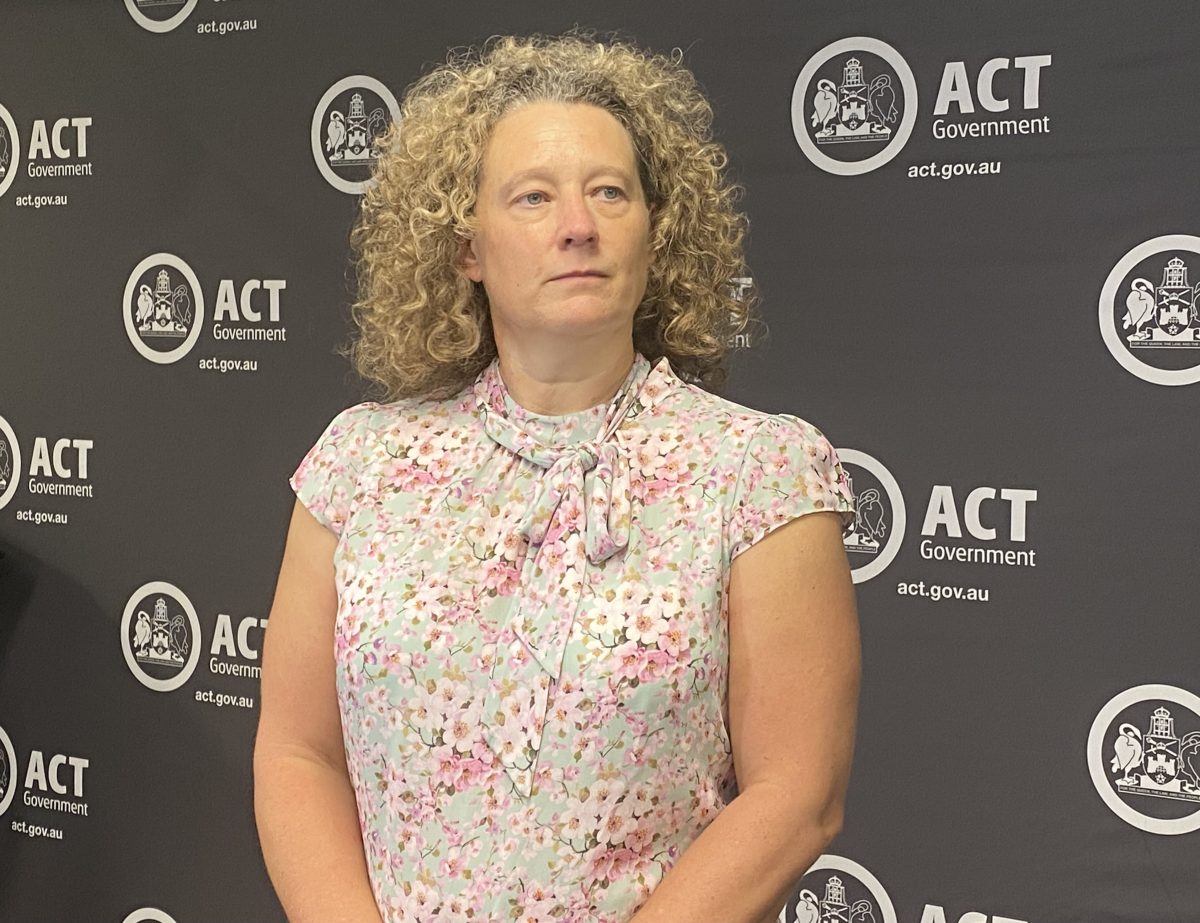
ACT Chief Health Officer Dr Kerryn Coleman said knowledge of these deaths wouldn’t have changed the public health response at the time. Photo: Claire Fenwicke.
An audit of COVID-related deaths in the Territory since March 2020 has uncovered another 61 deaths, increasing the total number of lives lost in Canberra due to the illness to 224.
It comes as ACT Health announced it will change the way it sources data on COVID-related deaths.
Chief Health Officer Dr Kerryn Coleman said the previously undiscovered deaths came down to how the data was collected during the height of the pandemic.
“During COVID, until the end of 2022, it was really important that we got the COVID-related death data as quickly as we possibly could, so we had requested that aged care facilities, hospitals and other practitioners let us know when they had a case that they thought was related to COVID. That gave us the most timely data available,” Dr Coleman said.
The review of deaths was undertaken as Dr Coleman said they knew the previous method of reporting wasn’t trouble-free and they had suspected they had missed some casualties, as had occurred in other jurisdictions.
All 61 new deaths occurred in 2022, and the highest number occurred in June and July, coinciding with a peak in cases reported to ACT Health.
The age range of the people who died was 68 to 102 years, and 60 per cent were men.
Most of these deaths (56 per cent) occurred in residential aged care facilities, while 18 per cent died at home, 16 per cent in ACT Public Hospitals and 7 per cent at a palliative care facility.
None of the people who died identified as Aboriginal or Torres Strait Islander.
Dr Coleman said the new deaths didn’t change the public health risk profile and would not have changed the government’s response to the pandemic at the time.
“This data is absolutely consistent with the data we were receiving through the personal and organisational notification process,” she said.
“I’m really confident that this additional information would not have changed our response in any way.”
A COVID-related death is defined when the presence of the disease has been noted on the death certificate.
While it may not have been the only condition a person was suffering from at the time, Dr Coleman said it was still relevant.
“If it was mentioned on the death certificate, we understand that the certifying practitioner assumed or intended for that to be recorded as an important factor,” she said.
ACT Health will now only use information from the Birth, Deaths and Marriages registry to collect data regarding COVID-related deaths.
This is because timely data is no longer needed to make quick public health decisions.
Dr Coleman said this would result in a lag in the data.
“During the peak of the disease, it could take four to six weeks, or even longer, to just get the process and the notifications going through to the registry and then be able to receive that data,” she said.
“We’ve managed to work with the registry on speeding that up a little bit … our aim would be [to receive the data] around two to three weeks.
“So there will be a little bit of a lag in the data, but hopefully, we’ve learned some lessons and put in place some efficiencies.”
More broadly, there appears to be less COVID in the community and fewer people with COVID in our hospitals.
But Dr Coleman said while there were lower levels of COVID circulating, and it was having less impact on people’s health, that didn’t mean the pandemic was over.
“What it means is that we will expect to see and can expect to see further waves into the future,” she said.
“But as we’ve said before, we’re really well positioned to be able to respond to those.”
She encouraged everyone to check their vaccination status, ask their doctor what dose would be recommended for them, and make a plan with their health practitioner about what to do if they developed symptoms.
“Do you need to get a test? What tests do you need to get? Do you need to get treatment, and how would you do so?” Dr Coleman said.
All this as the Territory’s COVID-19 Management Declaration is due to expire at the end of next month.
The ACT is the only jurisdiction to have middle-range capabilities in place, while all other states and territories only had the ability to call on emergency powers.
With mask-wearing and visitor restrictions easing in hospital settings earlier this week, the last rule still in place was mandatory reporting of RAT results.
Dr Coleman said that would be reviewed.
“We are now at a stage where we can consider potentially taking those remaining steps,” she said.
“We are talking with government about when and how we would look at potentially removing the public health direction for the requirement to report your RAT.”
The ACT has reported six COVID-related deaths in the current reporting period, along with 487 new cases.
The people who died were a man in his 90s, two men in their 80s, a man in his 70s, a woman in her 70s and a man in his 50s.
Ten people are in hospital with the virus; none are in ICU or need breathing support.





















